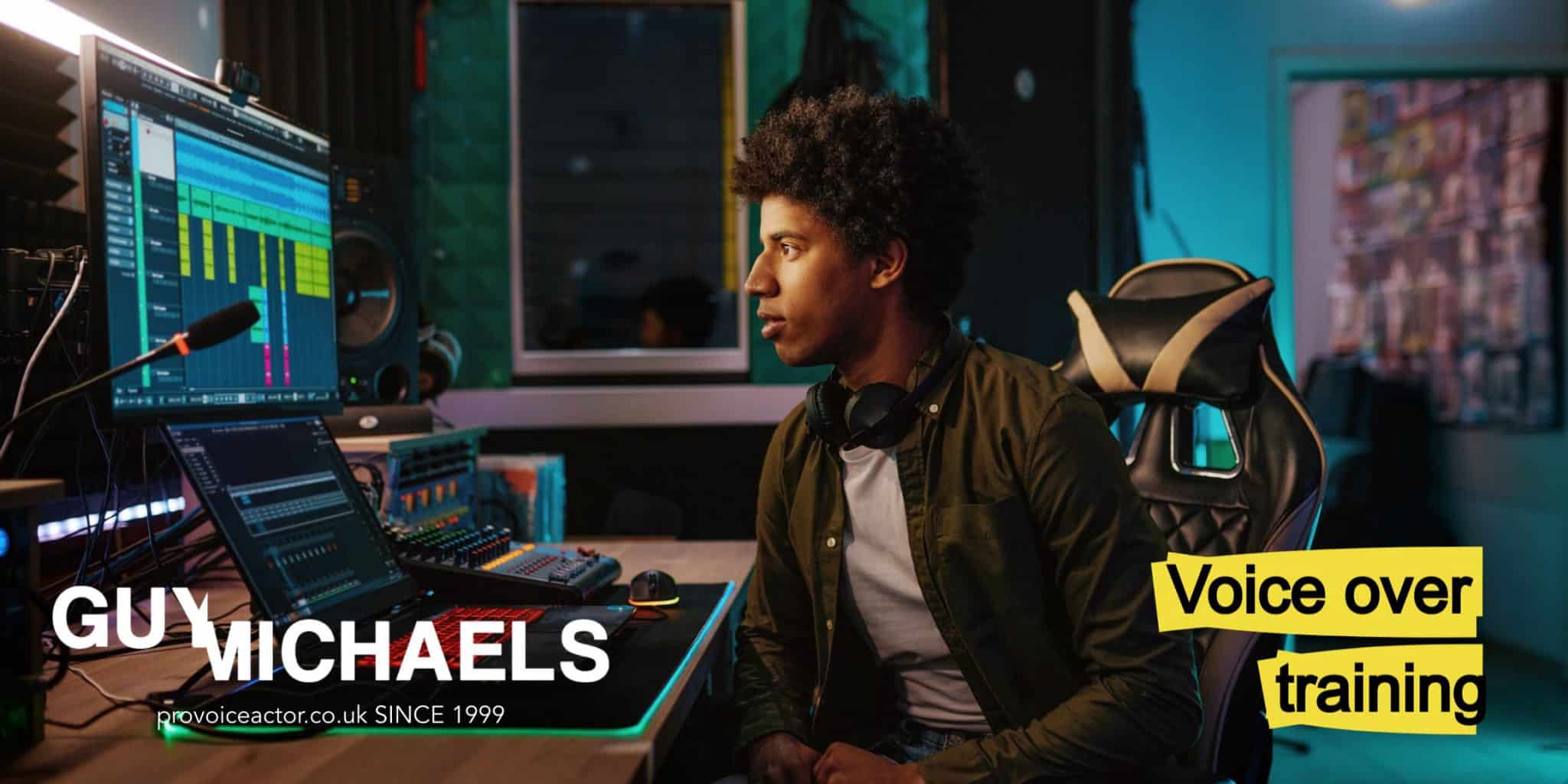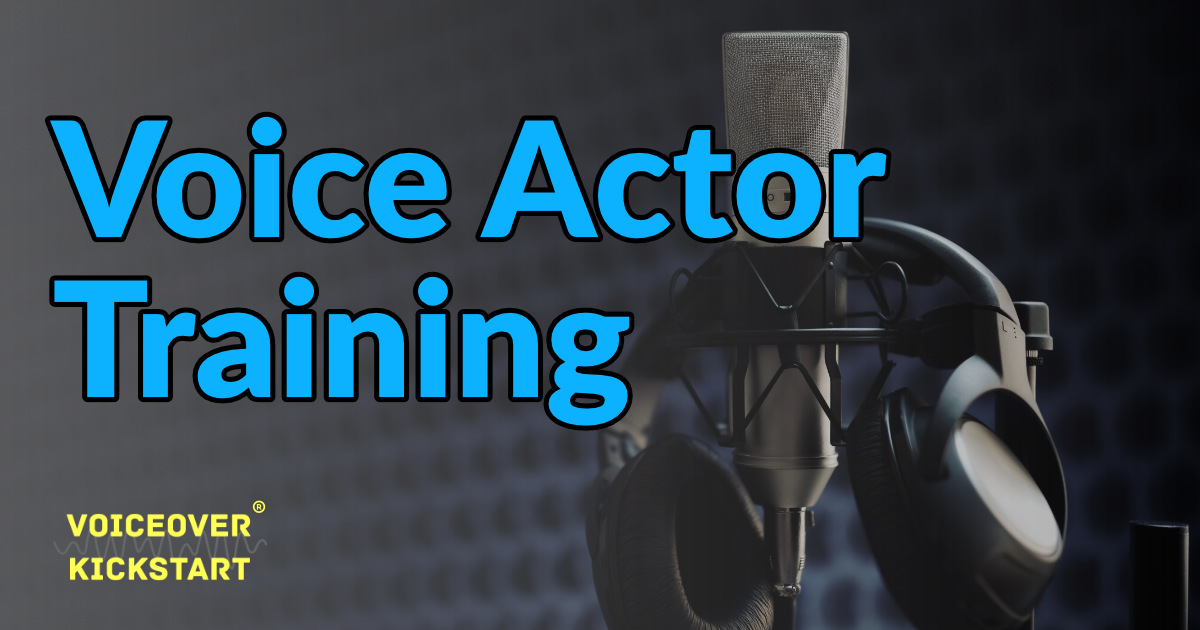Voice Over Training
“…those who can, do; those who can’t, teach.”
I’m sorry George Bernard Shaw, you were wrong.
Those who want to expand their knowledge and skills and get immense satisfaction witnessing the development of others…TEACH!
Voiceover training or ‘training’ in general is close to my heart. I am a very passionate believer in Continuing Professional Development (CPD) in any career, in any industry and as the voice over industry has seen such seismic changes in recent years, it is essential for each and every voice actor. None of us, even the most experienced voiceover artists, are above the need to learn and develop.
However, that ‘learning and developing’ in voiceover covers so much more than the talking part.
If you want to get started in voiceover then access my free voice over career webinar today
Voice actors need to work in order to work
The voice acting business demands skills in many areas other than the particular focus of performing into a microphone. I run a full production suite here in Cambridge (United Kingdom) and it’s perhaps overkill for the average voiceover job but developing the skills of an audio engineer to produce my own work and that of others has helped to enhance my business and income over two decades.
If you are an aspiring voice actor with the beginnings of a home recording studio then you’ll need to get your head around editing software, manipulate audio files and learn techniques to improve your audio quality. You’ll also need to learn many many other things that they don’t teach you at school, or college or university!
For new voiceover artists, the scale of the voice acting industry often comes as a surprise. Whilst there’s no such thing as a real voice over artist certification, there are a plethora of useful voice acting courses, both online and in-person. I offer many voice acting classes on my platform Voiceover Kickstart.
I’m a worldwide voiceover but I rarely travel for voice over work. A voice artist needs to be able to record remotely these days and I can show you how in a 121 voiceover coaching session.
How do you train for voice over work?
A much better question here would be ‘What do I need to learn and develop for voice acting?’.
For voice over training to be truly effective it must be a holistic approach and experience, targeting specific areas of weakness within the skillset of the specific voice actor. Voiceover artists themselves must learn ‘what’ to learn, what they must focus on to develop their business.
Although a typical voice over lesson might involve working with a script, professional voice actors work to perfect their voice acting skills in a number of ways. To build a flourishing and exciting voice acting career, you must do the same.
Here’s a non-definitive list of the topics successful voice actors work on:
VOCAL SKILLS for voice overs
It should go without saying that vocal skills are paramount when it comes to starting and developing a voiceover career.
Clarity – work your mouth! A voice actor has to be on top-form each and every day and ready to get their mouth around tricky phrases in clients’ scripts.
Breath control. Although not generally being asked to project or boom into the microphone, a pro voice actor must have full control and breath capacity for the demands of long sessions.
Voice over professionals know how to warm up for the rigours of daily voice work. Keep that instrument in top condition!
Acting skills. I completed four years of theatre and vocal training. Not essential or even practical for many, but that stage experience and pressure means that I’m ready for anything.
A voiceover artist must at least learn basic acting concepts and script interpretation skills to bring words to life in a meaningful way that connects with an audience. These skills can be attained in voiceover lessons.

TECHNICAL SKILLS for voice overs
Many of you will need to learn entirely new skills to create a voiceover career. Some will be very technical but my advice is to embrace this, get stuck in and learn all you can!
Listen once and listen again to professional audio recordings and your own and aim to work out how to improve your technical skill level and how to optimise your home studio.
You might not be able to afford a professional ‘sound booth’ but a voiceover career is entirely achievable even if you are recording in your bedroom. It will just take a lot of work, trial and error.
A voiceover artist must be able to record to a certain quality level. Even if they are just auditioning or giving an example ready for client, a voiceover in the 21st century needs to know their way around audio-editing software.
Although you might not need to go into the detail of sound design or production work, with so much voiceover being recorded in a home recording studio, you must learn the basics of audio and how to improve your space and the resulting recorded signal.
As a producer, I work with voiceover artists all over the world and one of the deciding factors of their employment these days is the ability to record decent quality audio.
From radio commercials to radio drama, explainer videos to audiobook narration, a plethora of voiceover jobs are recorded in a home environment these days.
My voice over training at Voiceover Kickstart covers the essentials for the voice actor working in a home studio set-up. Access my voiceover training platform and resources.
BUSINESS SKILLS for voice overs 
You’ve gotta get a handle on the business side!
Communication skills. After all, it’s what a voiceover does. Being a fantastic communicator at every step, whether speaking with casting directors, agents, clients or the audio engineers in a recording session, will increase the likelihood of that all-important repeat job from the same employer.
A financial head. If you haven’t got one, grow one. Be careful not to make rash decisions or waste money on equipment upgrades or crazy-expensive voiceover workshops.
As your own ‘head of finance’ make careful decisions and learn when you need to invest and when you need to save for the famine part of the reality of the feast/famine self-employed lifestyle.
Marketing know-how. You’re the best voiceover artist within 100 miles…but no-one knows who you are. Read. Read everything you can on marketing in the digital age. As you make your way in the industry you have to know where to find potential clients and how they can find you!
Although I don’t attend face-to-face workshops or training specifically in the art of voiceover (the actual speaking part), I do continue to learn as an avid reader of business and personal development books. Even after 23 years as a professional voiceover artist and audio engineer, I am enrolled in numerous modules on very specific audio and business related topics and when time allows, I dip in to improve my knowledge and stay up to date.
How do you get into being a voice over?
I can’t help but (cheekily) recommend my own highly-acclaimed voice over training, starting with the free voiceover webinars ‘ Get started in voiceover’ and ‘Developing your voiceover career’. Designed for voice actors at all levels, you can access the free voiceover webinar from anywhere. It’s fully online and will give you a really solid introduction – it’s useful for the experienced voiceover actor too. I’ve also written a massive practical guide How to start a voice over career
I promise you, that if you access both of these free voiceover resources, you’ll save time, money and stress as you start out in voice acting.

Other training
In addition to online classes, definitely check out in-person acting classes near you and enrol in every free programme and lap up every free resource. Learn and keep learning.
If for example, you want to work in audiobook narration (talking books) or develop character voices for animation, seek out ways to learn these specific skills and work with experienced professionals. Narration work can be very enjoyable and you can learn the basics in this short course: Learn Audiobook Narration with Helen Lloyd | Voiceover Kickstart

Do you need a coach for voice acting?
I wouldn’t say it is essential as it’s very much a career you can learn on the job. However, working with a voice over coach who has real experience and a proven track record, both as a voice and coach, can vastly accelerate your progress in voice acting.
For affordable personal 121 guidance, I also coach a few private sessions for voice actors each week: VOICEOVER COACHING
In voiceover coaching sessions with me we can cover most areas of the industry, many of the skills involved and you can rest assured that I’m talking from real experience and not just something I read in a book about how to get into the voiceover industry!
Voiceover coaching differs from voice over training in that you are benefiting from a more personal 121 experience that is tailored to your needs.

How much does it cost to be a voice actor?
Putting the studio equipment aside (see my voiceover training for details on this), aspiring voice actors must be prepared to invest in the essential tools. This includes a demo reel (professionally produced audio clips), a voiceover website (or you could just set up a listing on Voiceover Index – Your VOICEOVER production partner ) and probably some subscriptions to the P2P voiceover work services that are online. These act as a conduit between those seeking voiceover artists and the professional voice set up to record voice overs.
Depending on prior performance experience (are you a trained actor?) you’ll probably benefit from some vocal coaching in addition to voice over training. This is somewhat different from voiceover coaching, instead focussing on building a strong voice. You’d be looking up ‘voice training’ in Google rather than ‘voice over training’ or ‘voice over coach’. Every successful voice I know has worked with a voice coach at some point.
Can you be a self taught voice actor?
You can certainly take the first steps towards paid voiceover work but as mentioned right at the beginning of this article, we all need ongoing voice over training if we want to stay ahead of the competition.
It all adds up!
See, a voice over artist needs to commit to CPD and work out what they need in terms of voice over training on a weekly, monthly or annual basis. This way you’ll learn new techniques that help you to move beyond your natural voice. You’ll potentially open up new avenues of voiceover work and talent you didn’t even know you had!
That’s just the beginning…
If you are new to voiceovers, just remember that we all start somewhere. I’ve extensive experience and run a thriving voiceover business but it hasn’t always been that way.
I wish you luck in the exciting yet demanding world of voice acting!
Guy Michaels

Where can I learn more about Voice Over Training?
To learn more and to access free voice over training resources, head to Voiceover Kickstart today! If you search google for voice over training uk, you’ll see that my platform and voiceover coaching consistently come up in the top organic results as one of the most established services of its kind. I’ve worked with and coached many hundreds of voice over actors all over the world.
Plus, although written for voiceover producers, my Voiceover Expert guide will also help you on your path to becoming a professional in the voiceover industry.
